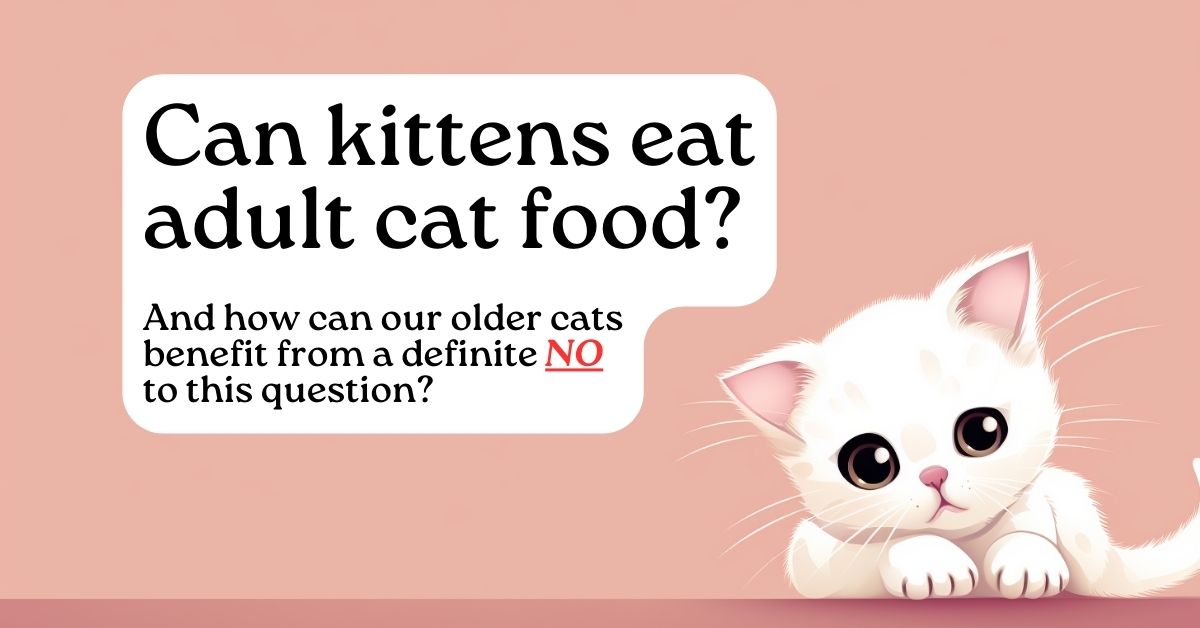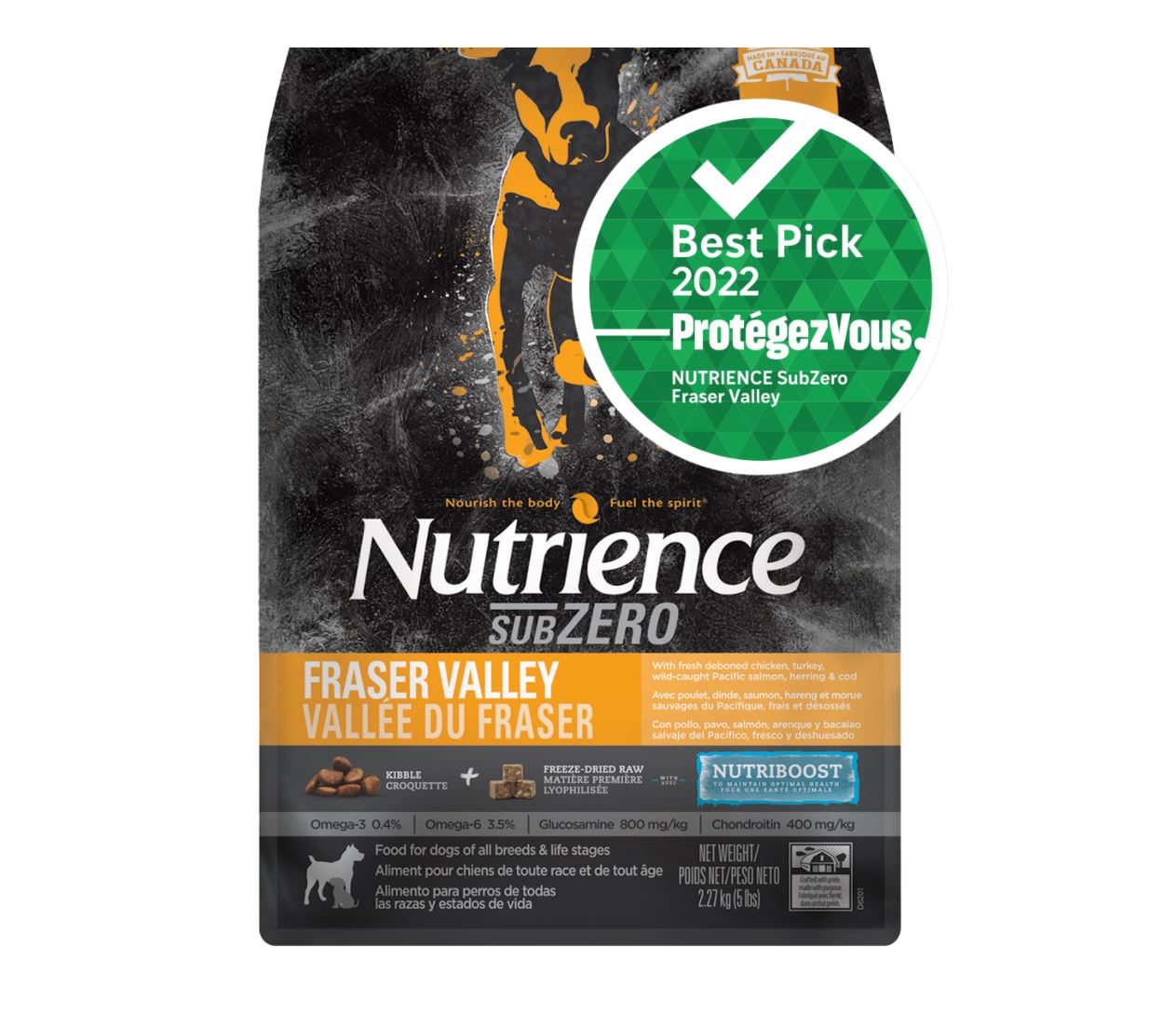
It’s tricky to answer, and if you don’t like TLDR then the short answer is no, you should never feed a kitten adult cat food.
However, there are some very interesting points we can cover, and excellent facts we can learn to benefit both the health of our kittens and our adult cats.
The difference between kitten and adult cat food
We’re mostly talking about kibble (or “biscuits”) when we talk about kitten or adult cat food, and most cat foods in Australia are “all life stages” which means they can be fed to kittens or adult cats.
Not all though, and it’s worth understanding what an “adult cat food” really is.
Kitten specific food tends to be much better nutritionally which is necessary for your kitten during their most critical growth-phase.
An adult only cat food, which won’t be labelled “all life stage”, can stop your kitten growing properly. You may not even notice until they reach middle age and start suffering various health conditions.
By then, you’ll probably put their dwindling health down to bad luck.
This is why you should never feed a kitten an adult cat food formula.
Kitten specific foods tend to have more meat, more animal protein and fat, and less “rubbish” a cat needs such as carbohydrates from grains or grain-free ingredients.
Even adult cats don’t need carbohydrates – they’re obligate meat-eating carnivores – yet pet food regulations allow more leniency with adult cat foods, which means pet food manufacturers can cut costs and make more profit with adult formulas.
Meat ingredients are expensive. Non-meat ingredients are cheap.
You can consider adult cat foods the least nutritious range of cat foods. The exception here is senior cat food recipes, but I’ll let you consider if more carbs are good for Pippin, your elderly protein-dependent furry jellybean.
All life stage cat foods meet the minimum requirements for all life stages of a cat, including the kitten/growth phase and senior years. Therefore, an “all life stage cat food” is your better option to an “adult cat food”, for your adult cat, or your senior cat.
Here are three rules of thumb:
- A kitten formula is better for your kitten than an all life stage formula, but either should meet the nutritional needs of your kitten.
- An all life stage formula is better for your adult cat, or senior cat, than an adult formula.
- You should never feed a kitten an adult cat food formula.
Let’s discuss the reasons your kitten should not be fed an adult cat food a little more, including the health issues it can cause in later years.
Why you should not feed your kitten an adult cat food
We know the growth phase of our kittens is vital, and we know nutrition is absolutely essential for their health and wellbeing.
When you have a kitten, this is the most important time for you to feed them a healthy, nutritious diet.
Adult cat foods do not meet the nutritional needs of your kitten.
Here are some key reasons why you should not feed your kitten adult cat food:
- Protein – Kittens need more protein in their diet than an adult cat, and by this I mean protein from animal sources rather from substitutes like corn or plant-based proteins. Protein is an essential building block for the growth and development of your kitten’s muscles, tissues, and organs. Adult cat food typically contains less protein, and less protein usually means more carbohydrates, and this won’t cover the nutrition your growing kitten needs.
- Amino acids – Kittens need specific amino acids, such as arginine and taurine, which are vital for their overall health and development. An adult cat needs amino acids as well, but kitten and all life stage cat foods will have these in higher concentrations to adult cat foods.
- Calcium and phosphorus – The balance of calcium and phosphorus in the diet is absolutely essential for bone and tooth development in kittens, and also maintenance for adult cats. A proper kitten food formula is designed to maintain the balance your kitten needs to develop healthy teeth and bones.
- Energy requirements – I’m sure you know already how active your kitten is compared to your neighbour’s chilled out tabby? Kittens are highly active and need more calories than an adult cat. An adult cat food may not provide enough calories to meet their energy needs, or provide those calories from grains which aren’t ideal for your kitten’s digestive system.
- DHA and EPA – Kitten food often contains higher levels of docosahexaenoic acid (DHA) and eicosapentaenoic acid (EPA). Don’t worry, you don’t need to know what these are, but in a nutshell are omega-3 fatty acids which are essential for your kitten’s brain and eye development.
- Nutrient density – Kitten food is more nutrient-dense than adult cat food to ensure your kitten receives all the essential vitamins and minerals they need for proper growth. As your kitten reaches adulthood you should consider this the other way – adult cat foods aren’t as nutritious for your cat.
- Digestibility – When it comes to dry cat food there should always be a question mark over digestibility. All dry food should be considered a convenience product, and the trade off of convenience is a less than optimal diet. Kitten food, simply from having a better emphasis on animal ingredients, will mean it should be easier for your kitten to digest than an adult-only cat food formula.
- Immune system support – Some kitten foods have added nutrients to support your kitten’s developing immune system. An adult formula may optionally contain such inclusions, but when it comes to pet food manufacturing the word “optional” means not worth spending money on.
- Dental health – I’ve left dental health to almost last for a reason, and that’s because I don’t see any dry cat food overfully beneficial for the dental health of your cat. Not compared to the natural benefits of raw meaty bones or dried-animal based chews or treats. However, the size and texture of kitten kibble is allegedly designed (often with dubious science) to encourage your kitten to chew, therefore promoting dental health. Adult sized kibble is often larger, which means these said scientific benefits may be lost, and in any case may be harder for your kitten to swallow.
- Weight control – Fat cats are everywhere, which I attribute mostly to how we feed our carnivorous cats so much grain, but nevertheless it’s an important factor to consider when we feed our cats dry food. Adult cat food are said to help maintain a stable weight, but the reality is they contain more carbohydrates which an adult cat may struggle to digest. You don’t want that for your adult cat, and you definitely don’t want that for your kitten.
Feeding an adult cat food to your kitten may result in digestive upset which you will notice immediately, or it could lead to growth and development issues, health issues in later years, or poor joints, arthritis, or a shorter lifespan.
What will happen if your kitten eats your older cats food?
If you have an adult cat in the household you’ll have no chance of keeping your kitten away from their food. You could try, but you’ll fail.
If your kitten manages to eat your older cat’s food then don’t worry too much, but you’ll want to minimise this as much as possible.
Your best option is to feed your older cat an “all life stage” formula, as this will also meet the nutritional needs of your kitten. Then you don’t need to worry, even if you have a kitten-specific formula especially for your kitten.
Better yet – fresh, BARF, or dried raw cat foods are almost carbohydrate free and much better for your kitten and adult cats. There’s some options here.
If your older cat eats your kitten’s food, then this will likely be beneficial for him. Again, you want to minimise this as much as possible as it may cause digestive upset (or cost you a bit more).
Rightly or wrongly, occasionally I buy my cat a small bag of kitten food. Sometimes a kitten formula of a brand will be the same price as the adult formulas, when the ingredients clearly show more animal ingredients in the kitten formula.
My cat is 13 by the way, so definitely no spring kitten.
When can a kitten transition to an adult cat food?
A kitten will enter the adult life stage around 1 year old (12 months), although large breeds such as a Maine Coon will only become an adult between 18 months to 2 years old (24 months).
Therefore, you should check for your specific breed when they can be transitioned to an adult cat food.
You should always transition to a new cat food gradually over a period of 1 to 2 weeks, but pay important consideration to the following:
- Cats, just like us, develop intolerances when fed a regulated and unvaried diet. If you do not feed your kitten a varied diet, they will likely have more issues when you introduce new foods. I don’t consider that a good thing even if pet food companies want to lock you into their brands for life. Do you?
The above point is often misinterpreted as a new food causing a cat to be a bit sick or have digestive issues (runny poo, smelly farts, gut ache, etc), when the reality is the cat has become very intolerant of anything other than the ingredients in the cat food they’ve been fed most of their life until now.
If you’re in doubt about your kitten reaching the adult life stage, err on the side of caution and feed a kitten diet for a little while longer.
Final thoughts and recommendations
Always do your best to choose a high-quality food for your cat, whether they’re a kitten, adult cat, or senior cat.
Never feed a cat food not appropriate to your cat’s life stage, so do not feed an adult or senior cat food to your kitten, or a senior food to your adult cat for that matter.
As a consequence your cat may get sick. They may not get sick immediately, but may suffer in later years.
If in doubt, consult with your veterinarian who will likely offer advice (although, more likely, recommend a grain-based cat food for your carnivorous cat).
Can kittens eat adult cat food?
That’s a resounding no.





